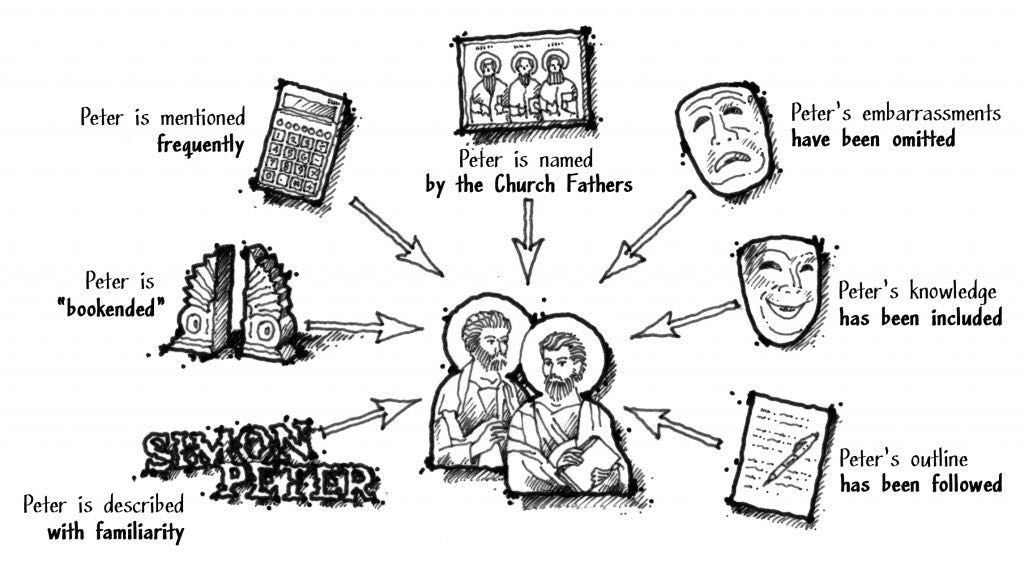When I first examined the New Testament Gospel accounts, I was intensely interested in their authorship. I found it interesting that two of the accounts were not written by (nor even attributed to) eyewitnesses. Luke wrote his account based on the testimony of “eyewitnesses and servants of the word,” but Mark’s Gospel is a bit more mysterious. Was Mark a previously un-named witness? Form whom did he get his information? I’ve written about the case for Mark’s source both at ColdCaseChristianity.com and in my book, Cold-Case Christianity. I believe the evidence points to the Apostle Peter as the authority for the material in Mark’s Gospel. In this post, I’d like to offer a Bible Insert summarizing briefly the case for Peter’s involvement (along with a graphic illustration of the cumulative case):
Peter is Described with Familiarity
More importantly, Mark is the only writer who refuses to use the term “Simon Peter” when describing Peter (he uses either “Simon” or “Peter”). This may seem trivial, but it is important. Simon was the most popular male name in Palestine at the time of Mark’s writing, yet Mark makes no attempt to distinguish the Apostle Simon from the hundreds of other Simons known to his readers (John, by comparison, refers to Peter more formally as “Simon Peter” seventeen times). Mark consistently uses the briefest, most familiar versions of Peter’s name.
Peter Is “Bookended”
Unlike other Gospel accounts, Peter is the first disciple identified in the text (Mark 1:16) and the last disciple mentioned in the text (Mark 16:7). Scholars describe this type of “bookending” as “inclusio” and have noticed it in other ancient texts where a piece of history is attributed to a particular eyewitness. In any case, Peter is prominent in Mark’s Gospel as the first and last named disciple.
Peter Is Mentioned Frequently
Peter is featured frequently in Mark’s Gospel. As an example, Mark refers to Peter twenty six times in his short account, compared to Matthew who mentions Peter only three additional times in his much longer Gospel.
Peter Is Named By the Church Fathers
A number of early Church witnesses and authorities confirm Peter as the source for Mark’s Gospel. Bishop Papias of Hierapolis (60-130AD) repeated the testimony of the old presbyters (disciples of the Apostles) who claimed Mark wrote his Gospel in Rome as he scribed the preaching of Peter (Ecclesiastical History Book 2 Chapter 15, Book 3 Chapter 30 and Book 6 Chapter 14). In his book, “Against Heresies” (Book 3 Chapter 1), Irenaeus (130-200AD) also reported Mark penned his Gospel as a scribe for Peter. Clement of Alexandria (150-215AD) wrote a book entitled “Hypotyposeis” (Ecclesiastical History Book 2 Chapter 15). In this ancient book, Clement confirmed Mark was the scribe of Peter in Rome. Early Christian theologian and apologist, Tertullian (160-225AD), also affirmed Peter’s contribution to Mark’s Gospel in “Against Marcion” (Book 4 Chapter 5). Eusebius (Ecclesiastical History Book 6 Chapter 25) also quoted a Gospel Commentary written by Origen (an early church father and theologian who lived 185-254AD) attributing the Gospel of Mark to Peter.
Peter’s Embarrassments Have Been Omitted
There are many details in the Gospel of Mark consistent with Peter’s special input and influence, including omissions related to events involving Peter. How can Mark be a memoir of Peter if, in fact, the book contains so many omissions of events involving Peter specifically? It’s important to evaluate the entire catalogue of omissions pertaining to Peter to understand the answer here. The vast majority of these omissions involve incidents in which Peter did or said something rash or embarrassing. It’s not surprising these details were omitted by the author who wanted to protect Peter’s standing in the Christian community. Mark was quite discreet in his retelling of the narrative (other Gospel writers who were present at the time do, however, provide details of Peters ‘indiscretions’ in their own accounts. See Cold-Case Christianity for a more detailed explanation).
Peter’s Knowledge Has Been Included
In addition to the omissions we have cited, there are a number of details included in Mark’s Gospel demonstrating Peter’s involvement and connection to Mark. As we describe a few of them, notice these inclusions are relatively minor and don’t seem to add much to the narrative. Their incidental nature is an indicator the author lacked a motive other than to simply include Peter’s perspective in the account. Peter’s involvement appears to have been faithfully recorded by his scribe and assistant, Mark.
Peter’s Outline Has Been Followed
Papias maintained the Gospel of Mark was simply a collection of Peter’s discourses (or his preaching) as this information was received and recalled by Mark. If we examine the typical preaching style of Peter in the Book of Acts (1:21-22 and Acts 10:37-41 for example) we see Peter always limited his preaching to the public life, death, resurrection and ascension of Jesus. Mark’s Gospel omits the private birth narrative and other details of Jesus’ life described in the opening chapters of Luke and Matthew. Mark begins with the preaching of John the Baptist and ends with the resurrection and ascension, paralleling the public preaching of Peter as we see it summarized in the Book of Acts.
There is sufficient cumulative, circumstantial evidence to conclude Mark did, in fact, form his Gospel from the teaching and preaching of the Apostle Peter. Click To Tweet
There is sufficient cumulative, circumstantial evidence to conclude Mark did, in fact, form his Gospel from the teaching and preaching of the Apostle Peter. I’ve illustrated the cumulative case for Peter’s involvement in the following way (excerpted from Cold-Case Christianity):

J. Warner Wallace is a Dateline featured cold-case homicide detective, popular national speaker and best-selling author. He continues to consult on cold-case investigations while serving as a Senior Fellow at the Colson Center for Christian Worldview. He is also an Adj. Professor of Christian Apologetics at Talbot School of Theology, Biola University, and a faculty member at Summit Ministries. He holds a BA in Design (from CSULB), an MA in Architecture (from UCLA), and an MA in Theological Studies (from Gateway Seminary).

































